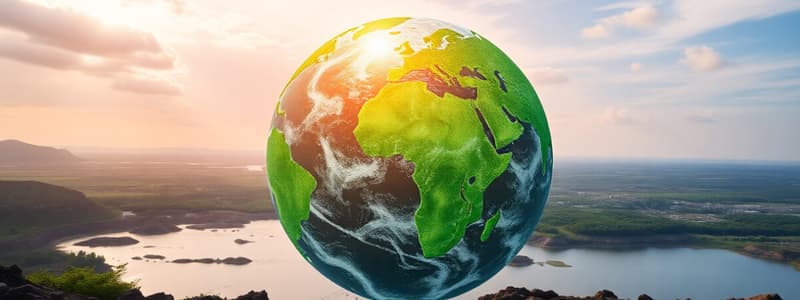Podcast
Questions and Answers
What is primarily responsible for the long-term increase in Earth's average surface temperature?
What is primarily responsible for the long-term increase in Earth's average surface temperature?
- Natural weather patterns
- Solar radiation
- Ocean currents
- Human activities (correct)
Which greenhouse gas is primarily emitted from fossil fuel combustion?
Which greenhouse gas is primarily emitted from fossil fuel combustion?
- Carbon dioxide (CO2) (correct)
- Nitrous oxide (N2O)
- Ozone (O3)
- Methane (CH4)
Which of the following is a direct effect of global warming?
Which of the following is a direct effect of global warming?
- Higher oxygen levels in the atmosphere
- Increased frequency of droughts (correct)
- Decreased sea levels
- Stable weather patterns
What is one of the primary aims of the Paris Agreement?
What is one of the primary aims of the Paris Agreement?
How does deforestation contribute to global warming?
How does deforestation contribute to global warming?
Which of the following is an effective strategy for mitigating climate change?
Which of the following is an effective strategy for mitigating climate change?
What happens to the oceans due to increased CO2 absorption?
What happens to the oceans due to increased CO2 absorption?
What is the greenhouse effect?
What is the greenhouse effect?
Flashcards are hidden until you start studying
Study Notes
Definition
- Global warming refers to the long-term increase in Earth's average surface temperature due to human activities, particularly the emission of greenhouse gases.
Causes
-
Greenhouse Gas Emissions:
- Carbon dioxide (CO2) from fossil fuel combustion.
- Methane (CH4) from agriculture and livestock.
- Nitrous oxide (N2O) from fertilizers.
-
Deforestation:
- Reduces the number of trees that can absorb CO2.
-
Industrial Processes:
- Release of various greenhouse gases.
Effects
-
Temperature Rise:
- Increase in global average temperatures.
-
Melting Ice Caps and Glaciers:
- Contributes to rising sea levels.
-
Extreme Weather Events:
- Increased frequency and intensity of hurricanes, droughts, and floods.
-
Ecosystem Disruption:
- Habitat loss and species extinction.
-
Ocean Acidification:
- Increased CO2 absorption by oceans affects marine life.
Mitigation Strategies
-
Reducing Fossil Fuel Use:
- Transition to renewable energy sources (solar, wind, hydro).
-
Energy Efficiency:
- Improving efficiency in buildings, transportation, and industries.
-
Afforestation and Reforestation:
- Planting trees to absorb CO2.
-
Sustainable Agriculture:
- Practices that limit greenhouse gas emissions.
-
Carbon Capture and Storage:
- Technologies to capture and store CO2 emissions from sources before they enter the atmosphere.
International Agreements
-
Kyoto Protocol:
- International treaty aimed at reducing greenhouse gas emissions.
-
Paris Agreement:
- Countries committed to limit temperature rise to below 2 degrees Celsius above pre-industrial levels.
Key Terms
- Greenhouse Effect: Natural process where certain gases trap heat, keeping the planet warm.
- Carbon Footprint: Total greenhouse gas emissions caused by an individual, event, organization, or product.
- Climate Change: Broad term encompassing global warming and its impacts, including shifting weather patterns and impacts on ecosystems.
Current Trends
- Ongoing increases in global temperatures, with recent years being among the hottest on record.
- Ongoing discussions and actions regarding climate policy and sustainability initiatives worldwide.
Global Warming: Causes and Effects
- Long-term increase in Earth's average temperature driven by human activities, primarily greenhouse gas emissions.
- Greenhouse gases include carbon dioxide (CO2), methane (CH4), and nitrous oxide (N2O). Sources include fossil fuel combustion, agriculture, and industrial processes.
- Deforestation significantly reduces CO2 absorption, exacerbating warming.
- Rising global temperatures lead to melting ice caps and glaciers, contributing to sea-level rise.
- Increased frequency and intensity of extreme weather events like hurricanes, droughts, and floods.
- Ecosystems are disrupted, causing habitat loss and species extinction.
- Ocean acidification, caused by increased CO2 absorption, harms marine life.
Mitigation and International Efforts
- Transitioning to renewable energy sources (solar, wind, hydro) is crucial to reduce fossil fuel dependence.
- Improving energy efficiency in buildings, transportation, and industries minimizes energy consumption and emissions.
- Afforestation and reforestation efforts help absorb atmospheric CO2.
- Sustainable agricultural practices reduce greenhouse gas emissions from farming.
- Carbon capture and storage technologies aim to prevent CO2 from entering the atmosphere.
- The Kyoto Protocol and the Paris Agreement are international treaties focused on reducing greenhouse gas emissions and limiting global temperature increases.
Key Concepts and Trends
- The greenhouse effect is a natural process that traps heat, but human activities have intensified it.
- Carbon footprint measures the total greenhouse gas emissions associated with an individual or entity.
- Climate change encompasses global warming and its resulting impacts on weather patterns and ecosystems.
- Global temperatures continue to rise, with recent years consistently ranking among the warmest on record.
- International collaboration and policy discussions on climate action are ongoing.
Studying That Suits You
Use AI to generate personalized quizzes and flashcards to suit your learning preferences.




